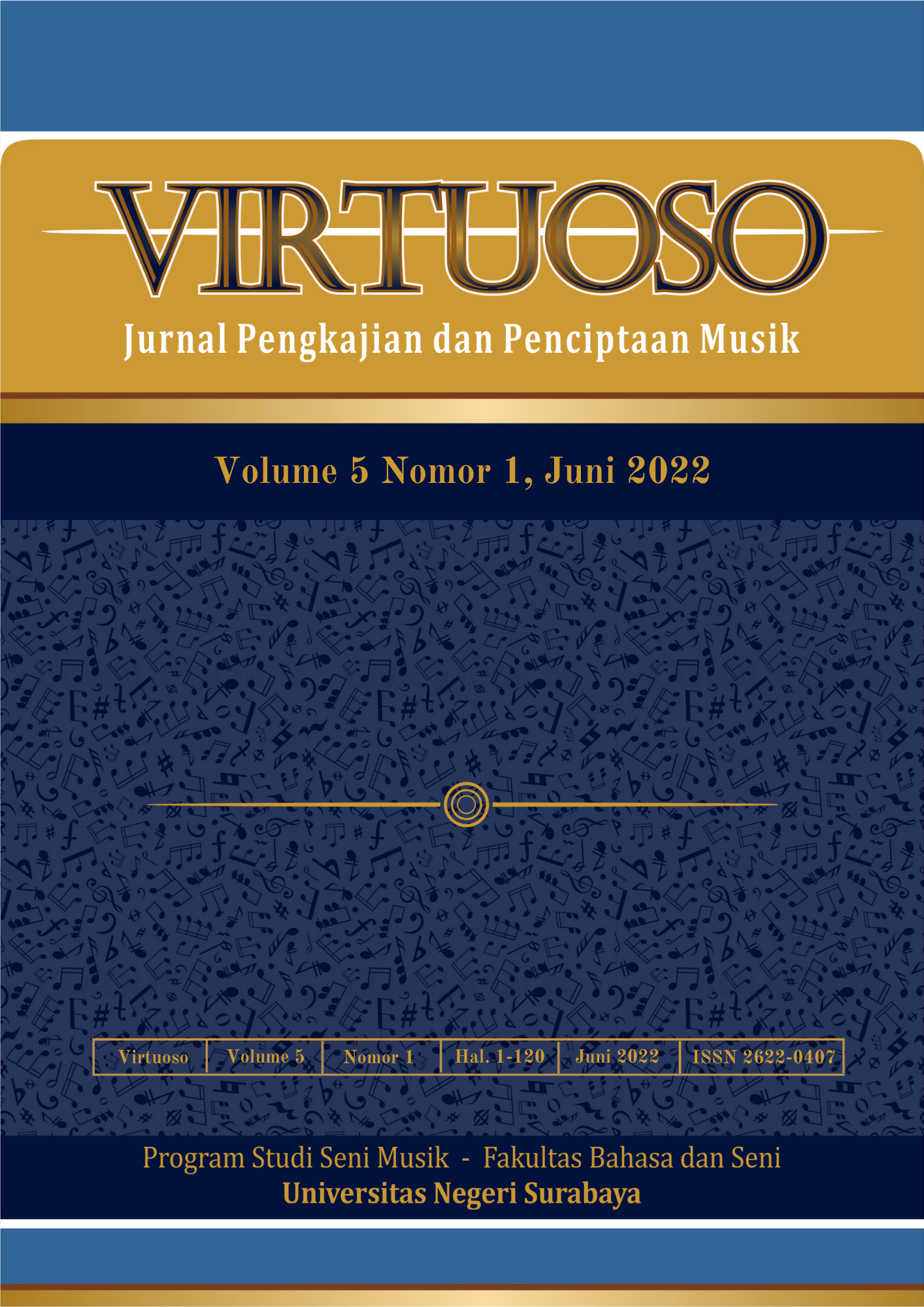Desain Penelitian Musik di Era Digital (Sebuah Tinjauan Studi Literatur)
Main Article Content
Abstract
Downloads
Article Details

This work is licensed under a Creative Commons Attribution-NonCommercial-ShareAlike 4.0 International License.
The copyright of the received article once accepted for publication shall be assigned to the journal as the publisher of the journal. The intended copyright includes the right to publish the article in various forms (including reprints). The journal maintains the publishing rights to the published articles.
References
Ahimsa-Putra, H. S. (2000). Seni dalam beberapa perspektif: Sebuah pengantar. In H. S. Ahimsa-Putra (Ed.), Ketika orang Jawa nyeni (pp. 13–42). Yogyakarta: Galang Press.
Ahimsa-Putra, H. S. (2020). Seni, seni budaya dan pendidikan seni perspektif antropologi. In I. N. Mariasa & A. Sudrajat (Eds.), Bunga rampai kajian seni budaya ragam perspektif (pp. 1–29). Surabaya: UNESA University Press.
Amer, K., & Noujaim, J. (2019). The great hack [Film]. Brooklyn, New York: The Othrs.
Andriessen, A. (2013). Research in higher professional education. Presentation presented at the ICON Conference in Kallio-Kuninkala, Finland.
Bazeley, P., & Jackson, K. (2013). Qualitative data analysis with NVivo (Second edition). Los Angeles London New Delhi: SAGE.
Booth, A., Sutton, A., & Papaioannou, D. (2016). Systematic approaches to a successful literature review (Second edition). Los Angeles: Sage.
Borgdorff, H. (2012). The conflict of the faculties. perspectives on artistic research and academia. Leiden: Leiden University Press.
Borgdorff, H. (2015). Onderzoek in het kunstvakonderwijs. Cultuur+Educatie, 15(43), 8–18.
Center for Global Ethnography. (2020). Christine Hine interview - Doing ethnography remotely [YouTube]. Retrieved 26 November 2021, from https://www.youtube.com/watch?v=XRn_eUQFhLQ
Diamandis, P. H., & Kotler, S. (2012). Abundance: The future is better than you think. New York: Free Press. Retrieved from www.SimonandSchuster.com
Djohan. (2021, Agustus). Penelitian seni pada PT seni dan non-seni. Presentation presented at the Seminar Nasional Daring: Penelitian Seni di Era Disrupsi, Surabaya. Retrieved 13 November 2021 from https://www.youtube.com/watch?v=MdBhmIciaNw
Hidayatullah, R. (2021). Music performance policy during covid-19 crisis: Expectations versus reality. Journal of Advance in Social Sciences and Policy, 1(1), 1–8. Retrieved from https://doi.org/10.23960/jassp.v1i1.17
Hine, C. (2015). Ethnography for the internet. UK; USA: Bloomsbury Academic.
Hood, M. M. (2021, October). Practice-based research and ‘local ontologies’ as creative resources. Presentation presented at the 1st International Conference On Music And Culture (ICOMAC), Semarang.
Hurwitz, J., Nugent, A., Helper, F., & Kaufman, M. (2013). Big data for dummies. Canada: John Wiley & Sons, Inc. Retrieved from www.wiley.com
IAML AIBM. (2015). Enriching the music experience: Making locally-developed digital resources accessible [YouTube Channel]. Retrieved 15 November 2021, from https://www.youtube.com/watch?v=ZqHhzZdA33s
Kayam, U. (1981). Seni, tradisi, masyarakat. Jakarta: Sinar Harapan.
Kozinets, R. V. (2015). Netnography: Redefined. (M. Steele,Ed.) (2nd Ed). Los Angeles ; London: SAGE Publications Ltd.
Kumar, S., West, R., & Leskovec, J. (2016). Disinformation on the web: Impact, characteristics, and detection of wikipedia hoaxes. In Proceedings of the 25th International Conference on World Wide Web (pp. 591–602). Republic and Canton of Geneva, CHE: International World Wide Web Conferences Steering Committee. Retrieved 13 November 2021 from https://doi.org/10.1145/2872427.2883085
Larasati, R. D. (2021, Agustus). Gagasan-gagasan tentang paradigma seni di masa disrupsi. Presentation presented at the Seminar Nasional Daring: Penelitian Seni di Era Disrupsi, Surabaya. Retrieved 13 November 2021 from https://www.youtube.com/watch?v=MdBhmIciaNw
Lee, R. M., Fielding, N. G., & Blank, G. (2017). Online research methods in the social sciences: An editorial introduction. In N. G. Fielding, R. M. Lee, & G. Blank, The SAGE handbook of online research methods (pp. 3–16). 1 Oliver’s Yard, 55 City Road London EC1Y 1SP: SAGE Publications Ltd. Retrieved 26 November 2021 from https://doi.org/10.4135/9781473957992.n1
Lutters, J. (2015). Art-based research. Een nieuwe grondslag voor een opleiding tot artist- educator. Cultuur+Educatie, 15(43), 63–70.
McAndrew, S., & Everett, M. (2015). Music as collective invention: A social network analysis of composers. Cultural Sociology, 9(1), 56–80. Retrieved from https://doi.org/10.1177/1749975514542486
Mustaqim, K., Adiwijaya, D. R., & Indrajaya, F. (2013). Penelitian atas penelitian seni dan desain: Suatu studi kerangka filosofis-paradigmatis bagi penelitian seni dan desain visual. Humaniora, 4(2), 995. Retrieved from https://doi.org/10.21512/humaniora.v4i2.3541
Raes, G.-W. (2014). Experimental art as research. In D. Crispin & B. Gilmore (Eds.), Artistic experimentation in music: An anthology (pp. 55–60). Leuven: Leuven University Press.
Rohidi, T. R. (2011). Metodologi penelitian seni. Semarang: Cipta Prima Nusantara Semarang.
Salam, S. (2021, Agustus). Penelitian pendidikan seni. Presentation presented at the Seminar Nasional Daring: Penelitian Seni di Era Disrupsi, Surabaya. Retrieved 13 November 2021 from https://www.youtube.com/watch?v=MdBhmIciaNw
Salkind, N. J. (2012). Encyclopedia of research design. United States of America: SAGE Publications.
Scrivener, S. A. R. (2002). The art object does not embody a form of knowledge. Working Papers in Art and Design. Retrieved from http://www.herts.ac.uk/artdes1/research/papers/wpades/vol2/scrivenerfull.htm
Smith, H., & Dean, R. T. (2009). Introduction: practice-led research, research-led practice – towards the Iterative cyclic web. In H. Smith & R. T. Dean (Eds.), Practice-led research, research-led practice in the creative arts (pp. 1–29). Edinburgh: Edinburgh Univ. Press.
Suharto, S. (2007). Refleksi teori kritik seni holistik : Sebuah pendekatan alternatif dalam penelitian kualitatif bagi mahasiswa seni. Harmonia: Journal of Arts Research and Education, 8(1). Retrieved 13 November 2021 from https://doi.org/10.15294/harmonia.v8i1.803
Supiarza, H., & Sarbeni, I. (2021). Teaching and learning music in digital era: Creating keroncong music for gen z students through interpreting poetry. Harmonia: Journal of Arts Research and Education, 21(1), 123–139. Retrieved from https://doi.org/10.15294/harmonia.v21i1.28585
Susilo Pradoko. (2020). Terapan metode penelitian hermeneutika Paul Ricoeur (Bagian 1, pengantar & contoh) [YouTube]. Retrieved 14 November 2021, from https://www.youtube.com/watch?v=QaPCfQBfRWg
Triyanto. (2014). Pendidikan seni berbasis budaya. Jurnal Imajinasi, 7(1), 33–42.
Triyanto. (2018). Pendekatan kebudayaan dalam penelitian pendidikan seni. Jurnal Imajinasi, 12(1), 65–76.
Varto, J. (2009). Basics of artistic research: Ontological, epistemological and historical justifications, University of Art and Design Helsinki Publication B94. Helsinki: Gummerus.
Wadiyo. (2003). Teori dan masalah penjelman seni dalam perspektf sosio-kultural. Harmonia: Journal of Arts Research and Education, 4(3). Retrieved 13 November 2021 from https://doi.org/10.15294/harmonia.v4i3.727

